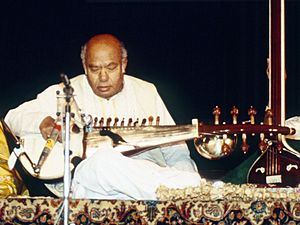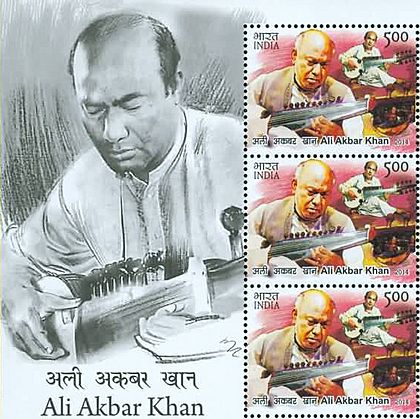Ali Akbar Khan facts for kids
Quick facts for kids
Ali Akbar Khan
|
|
|---|---|
 |
|
| Background information | |
| Born | 14 April 1922 Shibpur, Bengal Presidency, British India (present day Bangladesh) |
| Origin | Maihar (present-day Madhya Pradesh, India) |
| Died | 18 June 2009 (aged 87) San Anselmo, California, U.S. |
| Genres | Hindustani classical music |
| Occupation(s) | Composer, Sarodiya |
| Instruments | Sarod |
| Associated acts | Allauddin Khan, Ravi Shankar |
Ali Akbar Khan (born April 14, 1922 – died June 18, 2009) was a famous Indian musician. He was known for playing the sarod, a string instrument, very well. He played a type of music called Hindustani classical music.
His father, Allauddin Khan, was also a great musician and taught him. Ali Akbar Khan also wrote many classical songs called ragas and music for movies. He started music schools in India and the United States. One of his schools, the Ali Akbar College of Music, is now in California. He also helped make Indian classical music popular in Western countries. He visited America for the first time in 1955. Later, he moved to California.
Ali Akbar Khan received India's second highest award for civilians, the Padma Vibhushan, in 1989. He was nominated for a Grammy Award five times. He also won other important awards for his music.
Contents
Growing Up and Learning Music
Ali Akbar Khan was born in a village called Shibpur, which is now in Bangladesh. His father, Allauddin Khan, was a very famous musician and teacher. Soon after Ali Akbar Khan was born, his family moved back to Maihar, India. His father worked there as the main musician for the local king.
From a young age, Ali Akbar Khan learned many instruments from his father. He also learned how to create vocal music. But he loved the sarod the most. His father was a very strict teacher. Ali Akbar Khan's lessons often started before sunrise. They sometimes lasted for 18 hours a day!
He also learned to play the tabla and the pakhavaj (types of drums) from his uncle. During this time, he met other famous musicians who came to learn from his father. Later, his sister Annapurna Devi and fellow student Ravi Shankar joined his lessons. Ravi Shankar and Annapurna Devi got married in 1941.
Ali Akbar Khan once wrote about his training:
If you practice for ten years, you may begin to please yourself, after 20 years you may become a performer and please the audience, after 30 years you may please even your guru, but you must practice for many more years before you finally become a true artist—then you may please even God.
His Musical Journey
After many years of hard training, Ali Akbar Khan performed for the first time in 1936. He was only 13 years old. Three years later, he played the sarod with Ravi Shankar. This was the first of many duets, called jugalbandis, between them.
In 1938, Ali Akbar Khan played on the radio for the first time. From 1940, he performed monthly on the radio. In 1944, both Ali Akbar Khan and Ravi Shankar left Maihar. They started their careers as professional musicians. Ali Akbar Khan became the youngest Music Director for the radio station in Lucknow. He played solo and wrote music for the radio orchestra.
In 1943, Ali Akbar Khan became a court musician for the king of Jodhpur. He taught music and composed songs. The king gave him the special title of Ustad. When India became independent in 1947, the princely states ended. Ali Akbar Khan then moved to Bombay (now Mumbai).
In Bombay, he became famous for writing music for movies. He wrote music for films like Aandhiyan (1952) and Devi (1960). He also won an award for "Best Musician of the Year" for his music in Khudito Pashan (1960). Later, in 1993, he helped create music for the movie Little Buddha.
Starting in 1945, Ali Akbar Khan began recording music. He made records called 78 rpm disks. These could hold about three minutes of music. For one record, he created a new song called Raga Chandranandan. This song became very popular in India and around the world.
He performed all over India and traveled a lot in Western countries. In 1956, he started the Ali Akbar College of Music in Kolkata. His goal was to teach and share Indian classical music. He opened another school with the same name in California in 1967. Later, he moved it to San Rafael, California. In 1985, he opened another branch of his music college in Switzerland. Ali Akbar Khan was the first Indian musician to record a full album of Indian classical music in the United States. He was also the first to play sarod on American television.
Ali Akbar Khan played many famous duets with other musicians. He played with Ravi Shankar, Nikhil Banerjee, and L. Subramaniam. He also worked with Western musicians. He taught drummers from the band Grateful Dead. In 1971, he performed at the Concert for Bangladesh. Other famous musicians like George Harrison and Bob Dylan were also there.
Later Years and Passing
Ali Akbar Khan lived in the United States for the last 40 years of his life. He traveled and performed a lot until he became too unwell. He had been receiving dialysis treatments since 2004. He passed away at his home in California due to kidney failure.
Family and Legacy
Ali Akbar Khan had many children. Six of his children and one grandson are also musicians. They continue his musical legacy.
Awards and Honors
Ali Akbar Khan received many awards for his amazing contributions to music. He was given the Padma Bhushan in 1967. In 1989, he received the Padma Vibhushan, which is one of India's highest civilian honors. In 1991, he received a MacArthur Fellowship. This is sometimes called a "genius grant." He was the first Indian musician to receive it. In 1997, he received the National Heritage Fellowship. This is the highest honor for traditional arts in the United States. Ali Akbar Khan was nominated for a Grammy Award five times during his life.
Selected Music Recordings
With John Handy:
- Karuna Supreme (1976)
- Rainbow (1981)
With Ravi Shankar:
- The Master Musicians of India (1964)
Solo Albums:
- Sound of the Sarod: Recorded in Concert (around 1962)
- The Classical Music of India (1964)
- Bear's Sonic Journals: That Which Colors the Mind (2020)


